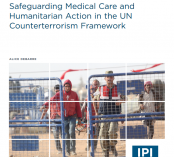
Report Executive Summary:
See full report here.
In the past decade, counterterrorism measures have had an increasingly adverse impact on the provision of medical care and the conduct of principled humanitarian action in armed conflict settings. Whether inadvertently or not, they have impeded, and at times prevented, the provision of essential and lifesaving aid, often in violation of international humanitarian law (IHL).
Counterterrorism efforts are not necessarily at odds with the rules of IHL, which apply only in situations of armed conflict. However, existing counterterrorism frameworks, including those developed at the UN, have arguably blurred the line between armed conflict and terrorism, thereby challenging the application of IHL. Moreover, counterterrorism policy often defines terrorism, terrorist acts, support to terrorism, and financing of terrorism too broadly. This can restrict humanitarian access to areas controlled by non-state armed groups, criminalize medical and humanitarian support to groups and individuals designated as “terrorist,” and lead to the harassment, arrest, and prosecution of medical and humanitarian workers.
To prevent the adverse impact of counterterrorism measures on humanitarian assistance in situations of armed conflict, the UN and its member states need to incorporate IHL into the complex counterterrorism architecture they have created. The Security Council’s cornerstone Resolution 1373 (2001) does not even mention IHL. While IHL has made it into subsequent counterterrorism resolutions, they remain vague on when it is applicable, they lack specific action points, and only one Security Council Resolution includes an exemption for humanitarian activities. Some UN counterterrorism entities have taken steps in the right direction, but there is still a lack of a systemic understanding of the issues and of concrete policies and guidance protecting medical care and principled humanitarian action.
A number of concrete measures could help reduce the impact tensions between counterterrorism efforts and obligations under IHL have had on medical care and impartial humanitarian action:
- All UN resolutions and other UN policies that pertain to counterterrorism should contain an exemption for humanitarian activities, including the provision of medical care, and states should adopt such exemptions domestically.
- Every relevant UN counterterrorism measure should continue to reiterate that counterterrorism efforts need to comply with international law, including international human rights law and IHL, and acknowledge and reaffirm obligations under IHL related to relief operations and medical care.
- Humanitarian actors should engage with UN counterterrorism structures more actively, strategically, and systematically.
- UN bodies that engage in counterterrorism should systematically include humanitarian actors in relevant conversations.
- The UN Counter-Terrorism Committee’s Executive Directorate (CTED) and Office of Counter-Terrorism (OCT) should better integrate IHL considerations into their work.
- Member states, UN entities, humanitarian actors, counterterrorism and sanctions experts, and other stakeholders should step up efforts to start a wider political discussion, particularly in New York, on the tensions between counterterrorism and humanitarian action, including medical activities.
See full report here.

